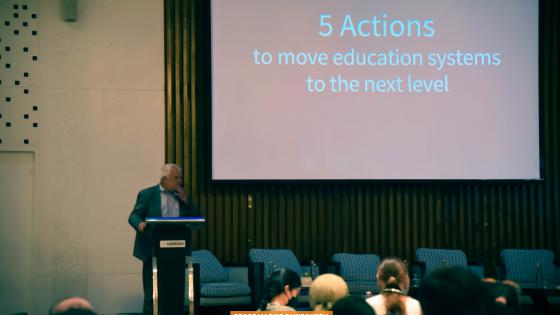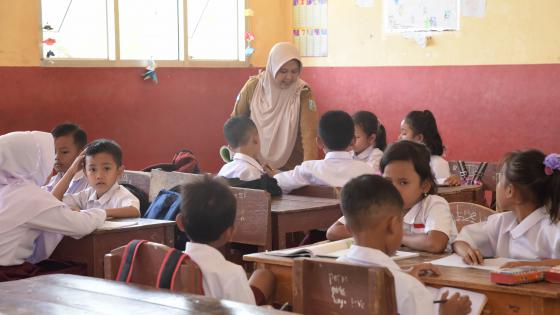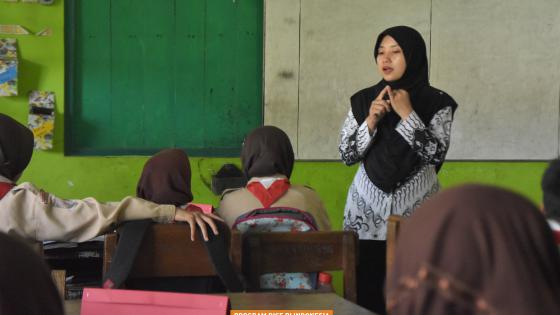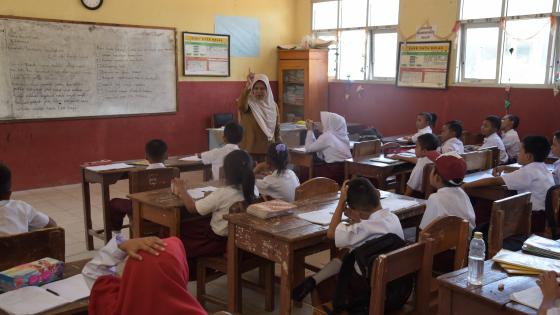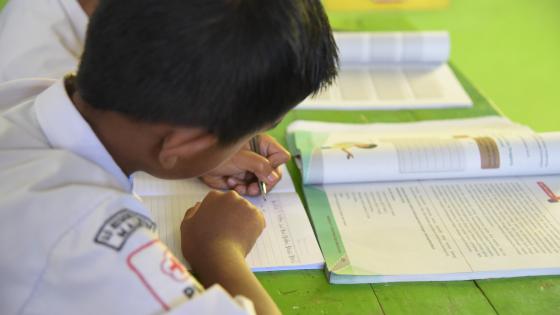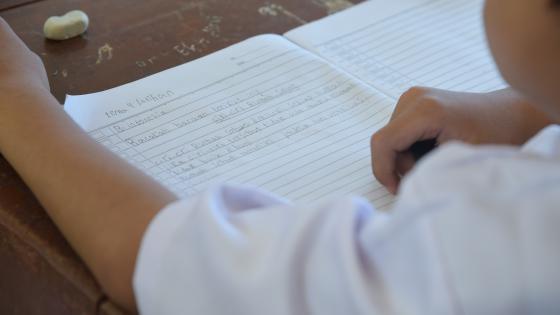Marda with students of class 2C. | Photos: Tony Liong
.
For Marda (32), a teacher at an elementary school in Lombok, being a teacher is both an opportunity as well as a challenge to be able to contribute to the development of students. Marda shared with RISE some of her experience about being a teacher and the qualities she believes every teacher must possess.
.
It was 10:00 a.m. at an elementary school in West Lombok Regency, West Nusa Tenggara. The bell rang, and students who were playing at the school corridor and schoolyard rushed towards their classrooms, including students of class 2C. Their classroom was on the left side of the building. They then sat on their chairs and opened their textbooks in orderly manners.

Students of class 2C walked into the classroom after the bell rang.
The student cohort for Grade 2 has three classes: 2A, 2B, and 2C. Every day, the second graders share their classrooms with the first graders. The smaller class uses the classroom from 7:30 a.m. to 10:00 a.m., then followed by the second graders. That morning, 28 students in class 2C were ready to learn.
Soon after that, familiar footsteps made the students turned their eyes towards the classroom door. “Good morning, Teacher!” the students exclaimed. “Good morning, Children,” the woman wearing a headscarf replied as she entered the classroom.
Marda, the teacher, walked up to her table in front of the class. She observed every student sitting neatly in small groups. Their faces, radiating with enthusiasm, are her source of ardour. They have been a part of her daily lives for the past year. Marda not only remembers the face of each of her student; she also knows each of their names and characters by heart.

Marda asked students who wanted to collect their savings to come to her desk.
As a teacher, Marda believes it is essential for her to recognise the character of each of her student. “Every student has a different character. Their level of understanding also varies,” she explained. “For example, there is a student who excels in math, but she lacks mastery in other subjects. Or, there is also a student who do not master many subjects, but he does well in art and culture. It’s not that the student is incompetent. They just need a little more time to learn; or, perhaps they need different teaching method. We must not think of him or her as stupid because each child has distinct strength.”

More than that, Marda understands that every student needs attention. “Some of them would try to get one by showing challenging behaviour, while the others would behave otherwise; being quiet and obedient. We cannot compare one child to another; the important thing is our method of approaching the child. We first need to get close to them, learn what their characters are. Only after that can we decide how to deal with the child,” Marda continued.
Improving Students’ Passion for Learning
An obstacle Marda often encounters while teaching is the students’ mood. Events or matters outside of school could affect their mood while learning in the class. Although they are generally easy to cheer up, sometimes Marda has to take more approach to make them share their problems before they could discuss other things.
Once in a while, to make learning more fun, Marda would take the students to study outside the classroom. For example, on that day, she took the students to gather on the schoolyard to learn math using an unconventional method. Marda asked the students to make rows based on a specific group of numbers. They then enthusiastically followed her instructions.

Marda was teaching math by instructing her students to form rows on the schoolyard. This is one of the creative learning methods that she sometimes used to refresh the learning atmosphere so that students would be more excited to learn.
Marda also emphasised the importance of students getting to know each other. That’s why she applies a switch-the-seatmate system every one or two months so that the students would have different seatmates. Thanks to this system, stories arose and had helped her have more profound understandings of her students.
“Sometimes students object, saying they don't want to sit with this or that friend that they think is trouble-maker. I would then ask the child who likes to annoy his friends, why he does that. Ultimately, this process would make him open up and reveal the reason for his action. Subsequently, we would tell him not to repeat such poor behaviour. Nonetheless, children can also come to their senses and be kind,” said Marda.
In addition to having different seatmates periodically, students also experience changes in the seating arrangement. Marda would occasionally change their seating; sometimes lined up, another time in groups, at other times U-shaped. These seating changes happen every once a month to refresh the learning atmosphere. “Thanks to this system, students can experience seating with each of their classmates alternately,” she added.
A Dream Come True
For Marda, becoming a teacher is a childhood dream come true. She had always admired the figure of a teacher who she saw as a smart person. She also found a teacher’s daily teaching in front of the class and being noticed by the students as pleasing.
Marda’s dream of becoming a teacher came true in July 2014 when she was officially an honorary teacher. On June 2015, she was assigned to the school where she now teaches until finally being appointed as a civil servant (PNS).
Marda said, her years of becoming a teacher has been filled with many memorable experiences. She recalled one that she remembers the most, told by a student’s parent.
There was a student who was cheerful and liked to read. He was broadminded and knew things that even Marda was not familiar with. One day, when visiting his grandmother in a city in Java, he told his parents that he did not want to go back to Lombok. His parents had tried to persuade him for almost a week, but he insisted that he did not want to return to Lombok.
“His mother told me that when she said ‘Don’t you miss Ms Marda?’ her son immediately changed his mind and said that he wanted to go home to Lombok. Hearing that, I instantly cried. That may be the most unforgettable experience for me, knowing that a student could have such an impression of me,” Marda reminisced.
That experience further realised Marda how much influence a teacher could have on his or her students, even on the things beyond learning.


Although school started at 10:00 a.m., these three students had already arrived at school more than an hour earlier.
Moreover, Marda feels that the relationships among teachers and school staff at where she teaches now are very open and mutually supportive. That motivates her to want to keep improving as a teacher. “I feel at home and am needed here,” she said.
Marda feels that her greatest happiness in teaching comes from meeting her students, who have diverse characters and backgrounds. She hoped that she could continue to be their teacher, so that she could help prepare them in facing the next stages in their lives, both at and outside of school. Marda also wished that later in life all of her students would become individuals who could contribute to their surroundings.
“No matter what their profession would be, whatever results might come, they have to be able to contribute to society. Even if they can’t contribute something big, even if they can’t become a president, they could at least be useful to the people around them,” Marda concluded.

A quote to motivate the students to be brave in improving their skills. It was displayed on the outer wall of class 2C.


